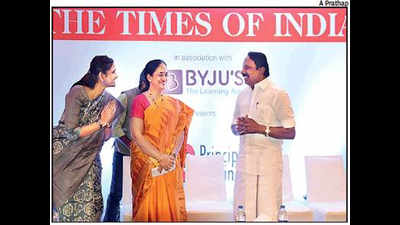- News
- City News
- chennai News
- Students to get 2 marks for planting 2 trees
Trending
This story is from February 1, 2019
Students to get 2 marks for planting 2 trees

EDUCATION FIRST: School education minister K A Sengottaiyan interacts with Lalitha Balakrishnan, principal of MOP Vaishnav College for Women, and (left) Saundarya Rajesh, social entrepreneur, founder and president of AVTAR Group, at the Times NIE Principals' Seminar on Thursday
CHENNAI: Worried about flunking the maths exam by a couple of marks? Go plant a couple of trees.
The state government is planning to award two marks for each subject for every two trees planted by the student. The proposal is awaiting the chief minister’s nod, said school education minister K Sengottaiyan on Thursday.
Speaking at the Times NIE Principals’ Seminar 2019, Sengottaiyan said, “There are 50 lakh students in Tamil Nadu and if every single student grows two plants, the state will have more than 2.5 crore trees.”
He urged students to explore new streams of education and not confine themselves to engineering and medicine.“Some 80 lakh engineering students are unemployed. Tamil Nadu has 1.68 lakh degree holders without jobs,” he said. The new curriculum will have 258 streams for students to choose from.
The gathering of more than 150 school principals discussed modernisation of education, with MOP Vaishnav College principal Lalitha Balakrishnan, Meenakshi Group & Shri Muthukumar Educational Trust managing director Jayanthi Radhakrishnan and social entrepreneur and AVTAR Group founder Sanundarya Rajesh as panellists.
Saundarya noted that the percentage of women at workplace has sharply declined. She urged educators to focus on skills outside the classroom like gender intelligence, generational competence and socio-economic sensitivity. “For this, technology should benefit us and not become an impediment,’’ she said.
Lalitha Balakrishnan echoed the sentiment. “Technology should complement teaching methodologies through digital lectures and screenings. Students, parents and teachers must be involved in the process,” she said.
Jayanthi Radhakrishnan stressed on the need to make learning more interactive as the present curriculum restricts students from reaching their potential. “Personalised education should be provided and schools must create opportunities for students to explore options,” she said.
The seminar was held in association with Byju’s the Learning App.
The state government is planning to award two marks for each subject for every two trees planted by the student. The proposal is awaiting the chief minister’s nod, said school education minister K Sengottaiyan on Thursday.
Speaking at the Times NIE Principals’ Seminar 2019, Sengottaiyan said, “There are 50 lakh students in Tamil Nadu and if every single student grows two plants, the state will have more than 2.5 crore trees.”
He urged students to explore new streams of education and not confine themselves to engineering and medicine.“Some 80 lakh engineering students are unemployed. Tamil Nadu has 1.68 lakh degree holders without jobs,” he said. The new curriculum will have 258 streams for students to choose from.
The Class XII curriculum, which will be revised next year, will have more job-oriented and entrepreneurial topics. The government is also planning to introduce yoga and physical education next year. He said 100 playgrounds will be opened in as many schools.
The gathering of more than 150 school principals discussed modernisation of education, with MOP Vaishnav College principal Lalitha Balakrishnan, Meenakshi Group & Shri Muthukumar Educational Trust managing director Jayanthi Radhakrishnan and social entrepreneur and AVTAR Group founder Sanundarya Rajesh as panellists.
Saundarya noted that the percentage of women at workplace has sharply declined. She urged educators to focus on skills outside the classroom like gender intelligence, generational competence and socio-economic sensitivity. “For this, technology should benefit us and not become an impediment,’’ she said.
Lalitha Balakrishnan echoed the sentiment. “Technology should complement teaching methodologies through digital lectures and screenings. Students, parents and teachers must be involved in the process,” she said.
Jayanthi Radhakrishnan stressed on the need to make learning more interactive as the present curriculum restricts students from reaching their potential. “Personalised education should be provided and schools must create opportunities for students to explore options,” she said.
The seminar was held in association with Byju’s the Learning App.
End of Article
FOLLOW US ON SOCIAL MEDIA










